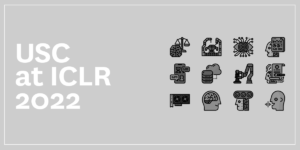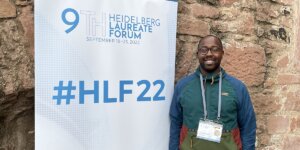ISIs Patrick Pantel was part of an elite group of ten young scientists representing the United States at the November 10-12 World Science Forum in Budapest.
National Science Foundation leaders selected Pantel, a specialist in natural language processing who has an appointment as a research assistant professor in the USC Viterbi School, to attend the gathering, the second in a series meeting under the auspices of the Hungarian Academy of Sciences and UNESCO.

Pantel (left) and his nine colleagues spanned a wide range of disciplines from CS and biology to social sciences and philosophy. They came together during the intensive two and a half days of speeches, meetings and activities in the Hungarian capital focusing on “Knowledge, Ethics, and Responsibility.”
“In the past,” the WSF organizers write, “the main role of science has been the production of new knowledge in order to satisfy the inherent curiosity of the human mind. Most recently, scientific advancement has become the main driver for development in society.”
The meetings set themselves the ambitious goal of reaching “a common ground for the new roles of knowledge and science in today’s global society.” If this was not totally achieved, the conference concluded with a set of six “final recommendations” dealing with communication, education, ecology, sustainability and other societal-scientific issues.
The program was excellent, Pantel said, “but what I really came away with was a great bond” with the other NSF delegates.
Pantel singled out two presentations as exceptional: a speech by behavioral biologist Jane Goodall (who has been a Distinguished Adjunct Professor in the USC College Department of Anthropology and the Department of Occupational Science and Occupational Therapy since 1990). Goodall spoke argued that our inheritance from our primate anscestors include “responsibility as to the consequences of our activities as well, especially regarding the environment which we share with other species.”
Also impressive was 93-year-old Otto van Habsburg, Honorary President of the Paneuropean Union, who “was the claimant to the thrones of Austria, Hungary, Bohemia etc. until he renounced his claims in 1961 so he could re-enter Austria and be more active in current European politics,” per the family website.
“He said scientists must to be frank about the reality of our world. We must engage with the politicians since they are the ones that are making the policies that shape our world,” Pantel recollected.
“Additionally, we were also addressed by the President of Hungary, the Prime Minister of Hungary, the Director General of UNESCO Koïchiro Matsuura, and three Nobel laureates,” Pantel said.
Preceding the WSF, the NSF delegates participated in a satellite meeting of the World Academy of Young Scientists. Under the aegis of UNESCO, WAYS sets forth to be the global network for young researchers, providing a forum for exchanging information and for fostering collaboration between young scientists worldwide. Pantel has the following advice to fellow young scientists: “As leaders of critical thinking, it is not only our responsibility to understand the nature of our world, but as importantly to implicate ourselves in the policies that shape our society.”

The team. NSF Assistant Director for Computer & Information Science and Engineering Peter Freeman, who led the ten-scientist delegation, is in the center, Pantel is second from right.

Published on November 18th, 2005
Last updated on August 9th, 2021












